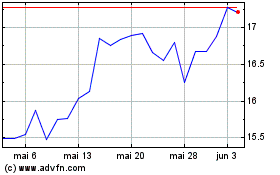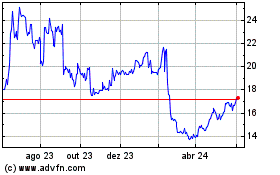U.S. index futures fell in pre-market trading on Wednesday as
investors await the August inflation report and assess the
presidential debate between Donald Trump and Kamala Harris.
At 5:24 AM, Dow Jones futures (DOWI:DJI) fell by 199 points, or
0.49%. S&P 500 futures lost 0.41%, and Nasdaq-100 futures
dropped 0.46%. The 10-year Treasury yield stood at 3.609%.
On the U.S. economic agenda, the August Consumer Price Index
(CPI) data will be released at 8:30 AM, with a monthly increase
forecasted at 0.2%, repeating the previous figure. The annual CPI
is expected to show a 2.6% rise compared to the previous 2.9%. The
core CPI, excluding volatile items, is also projected to rise 0.2%
in August and 3.2% annually, in line with the previous report.
In commodities, oil prices rose as concerns over Hurricane
Francine disrupting U.S. production outweighed Tuesday’s sharp drop
and OPEC+ demand revisions. The U.S. crude oil inventory decline
and rising Chinese imports helped boost prices.
West Texas Intermediate crude for October rose 2.33% to $67.28
per barrel, while Brent for November rose 2.05% to $70.61 per
barrel.
Gold (PM:XAUUSD) rose for the third consecutive day, trading at
around $2,5253.97 an ounce, as U.S. inflation data awaited could
signal the size of future Federal Reserve rate cuts. Investors are
closely watching labor market weakness, which could lead to rate
cuts and benefit gold.
Iron ore is testing support at $90 per ton after falling to its
lowest level in almost two years. The decline is driven by a
slowdown in China’s steel sector, saturating the market. While
major miners like BHP and Vale can withstand low prices, smaller
producers may be forced to close.
Asia-Pacific markets retreated on Wednesday. Japan’s Nikkei 225
fell 1.49% to 35,619.77, marking its eighth consecutive day of
losses, while the Topix dropped 1.8%. South Korea’s Kospi fell
0.4%, but the Kosdaq rose 0.46%. In Australia, the S&P/ASX 200
fell 0.3%. Hong Kong’s Hang Seng dropped 0.65% in final trading,
and China’s CSI 300 fell 0.3%.
Shares of Asian lithium producers surged after rumors that CATL
halted production at a major mine in China, alleviating concerns
over excess supply. The stoppage could reduce monthly lithium
carbonate output, pushing prices up as much as 23% by year-end,
according to Bloomberg. Among the companies, Tianqi
Lithium shares jumped in Hong Kong, while Pilbara
Minerals (ASX:PLS) shares rose 14.5% in Sydney.
Shares of Star Plus Legend Holdings, backed by
pop star Jay Chou’s mother, plunged 73% on Wednesday for no clear
reason. The price fell below IPO levels for the first time since
listing in July 2023. Trading volume was 43 times the daily
average. The company, known for products associated with Chou, saw
its market cap drastically shrink in three days.
In Japan, business confidence among large manufacturers fell to
a seven-month low in September, impacted by weak demand in China,
according to a Reuters survey. Additionally, the services sector
also saw a decline in optimism, although there are signs of
recovery in some segments, like semiconductors.
The Bank of Japan may raise interest rates if inflation
continues as projected, despite the recent market downturn.
Monetary authority Junko Nakagawa highlighted the bank’s need to
consider market volatility when making decisions. With core
inflation at 2.7% and economic data showing growth, the yen
strengthened, and further rate hikes may occur by year-end.
Mitsui announced it would double its share
buyback spending to 400 billion yen ($2.84 billion), aiming to
acquire and cancel up to 6% of its outstanding shares. The company
has already repurchased 2.64% of its shares and plans to continue
until February 2025.
In India, Prime Minister Narendra Modi highlighted the ambition
to expand its electronics sector to $500 billion by the end of the
decade. At a semiconductor event, he praised the country’s
potential, which currently has a $155 billion electronics
market.
India faces a challenge to become a reliable alternative to
China as an industrial hub, due to bilateral tensions, according to
Reuters. Since the 2020 conflict, the Indian government imposed
restrictions on Chinese investments but is now looking to ease
these barriers to attract more capital and technology, crucial for
high-tech sectors.
Additionally, Ford (NYSE:F) is in discussions
with the Indian state of Tamil Nadu to resume vehicle production
with a focus on exports. The automaker halted manufacturing in
India three years ago due to low sales but is now considering using
its Chennai plant to produce electric cars for export.
In South Korea, the unemployment rate fell to a record 2.4% in
August, seasonally adjusted, from 2.5% in July. This is the lowest
rate since the series began in June 1999, according to Statistics
Korea.
The Reserve Bank of Australia (RBA) reported that the labor
market is adjusting, with a moderate slowdown in demand due to high
interest rates. While unemployment rose to 4.2%, there are still
signs of a tight market and recovery in migration and labor force
participation, according to Sarah Hunter of the RBA.
European markets are trading higher, driven by anticipation of
U.S. inflation data due later. In July, the UK economy remained
flat, with lower-than-expected growth of 0.2%. GDP did not grow in
June and saw a slight 0.5% increase over the last three months. The
services sector grew by 0.1%, while production and construction
fell by 0.8% and 0.4%, respectively.
Amazon Web Services (AWS) revealed plans to
invest £8 billion in the UK over the next five years to increase
data center capacity. The initiative is expected to contribute £14
billion to the UK’s GDP and create more than 14,000 jobs.
Shares of Inditex, Zara’s parent company, rose
as sales rebounded, while Rentokil (LSE:RTO)
shares fell more than 18% due to lower-than-expected sales in North
America.
Shares of Commerzbank (TG:CBK) jumped 17% after
UniCredit (BIT:UCG) acquired a 9% stake, fueling
speculation about a potential merger. UniCredit bought 4.5% of
Commerzbank from the German government and the remainder on the
market. Meanwhile, UniCredit shares rose 1.7%. Germany still owns
12% of Commerzbank.
Abu Dhabi National Oil Company (ADNOC) plans to
offer approximately $15.90 billion to acquire
Covestro (TG:1COV), including debt. After a year
of monitoring, ADNOC made an improved offer, leading Covestro to
open its data for negotiations.
LVMH (EU:MC) is in talks to become a principal
sponsor of Formula 1, promoting its brands like Tag Heuer and Moët
& Chandon. LVMH plans to announce the deal before year-end. The
agreement, potentially worth $150 million annually, represents
direct competition with current sponsor Rolex.
In August, Germany saw a 10.7% increase in insolvencies compared
to the previous year, according to statistics office data. Since
June 2023, insolvencies have risen at a double-digit rate, except
for a slight dip in June 2024. In the first half of 2024, corporate
insolvencies rose by 24.9%, with transportation, construction, and
business services sectors being the most affected.
On Tuesday, U.S. stocks had a volatile session, driven by
anticipation of inflation data. The Nasdaq rose 0.84%, closing at
17,025.88, while the S&P 500 gained 0.45%, reaching 5,495.52.
However, the Dow Jones dropped 92.63 points (-0.23%), closing at
40,736.96. Banking stocks saw sharp declines, with the KBW Bank
Index falling 1.8%.
CME Group’s FedWatch tool estimated a 69% chance of a
25-basis-point rate cut and a 31% chance of a 50-basis-point cut at
the Federal Reserve’s next meeting.
The debate between Donald Trump and Kamala Harris was heated and
contentious. It began cordially with Trump and Harris exchanging
greetings but ended with each going in opposite directions. During
the second half, Harris spoke more than Trump, but he continued to
dominate the conversation, discussing topics such as immigration
and border policies. Harris also attacked Trump on his legal issues
and his positions on Israel.
Following the debate, Taylor Swift expressed her support for
Harris, praising her commitment to important causes. Although the
race remains close, Harris’s performance could positively influence
her electoral chances in the coming days.
The debate brought little clarity on key political issues like
tariffs and taxes. Despite Harris gaining slightly in election
forecasts, the impact on markets was modest. Investors remain
primarily concerned about the U.S. economy and potential Federal
Reserve actions, reflecting reduced short-term volatility.
Before the market opens, quarterly reports from
Manchester
United (NYSE:MANU), Hepsiburada (NASDAQ:HEPS), Designer
Brands (NYSE:DBI), Vera
Bradley (NASDAQ:VRA), and Tsakos Energy
Navigation (NYSE:TEN) will be released.
After the close, numbers from Oxford
Industries (NYSE:OXM), Lesaka
Technologies (NASDAQ:LSAK), and more are
expected.
Manchester United (NYSE:MANU)
Gráfico Histórico do Ativo
De Dez 2024 até Jan 2025

Manchester United (NYSE:MANU)
Gráfico Histórico do Ativo
De Jan 2024 até Jan 2025
